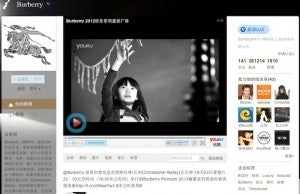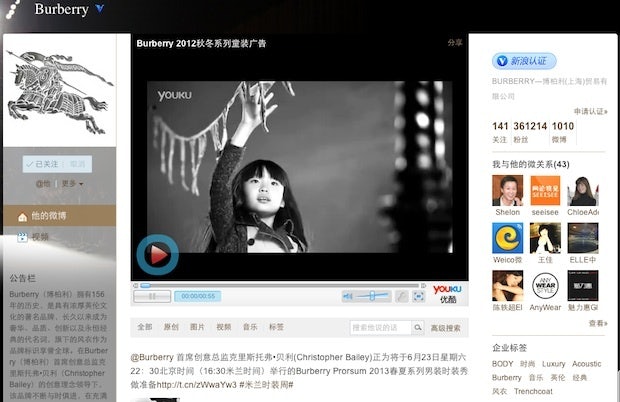Fake Accounts, Spammers, "Water Armies" Proliferate On Popular Chinese Platform#

For luxury brands hoping to capture the hearts and minds of younger Chinese consumers, newer social media platforms like
WeChat#
(weixin) might be the talk of the town at the moment, but for the last 18 months, three-year-old Sina Weibo (often, and mostly inaccurately, described as "China's Twitter) has been the focus of most major brands' online PR efforts in mainland China. Since Weibo burst onto the luxury scene, led by relative "early adopters" like Louis Vuitton and Burberry that launched official pages in early 2011, the most successful luxury brands adopting the platform have either gained a strong following via rich features (Bentley), giveaways and promotions, live-streaming events (Dior, Hugo Boss, Coach) or via a strong and compelling personality (Marc Jacobs, Diane von Furstenberg).
Boasting a user base of over 300 million, Sina Weibo has been increasingly seen by luxury brands operating in China as a "must" for not only reaching, but fully engaging, China's luxury consumer. However, developments in the way Weibo is being used by opportunistic companies and individuals are starting to call into question the platform's long-term viability. As Hong Huang writes in her ChinaFile column for WWD this week, the commercialization of Weibo -- while important for brands -- has not been an entirely healthy process:
I have 5.5 million followers and my private mail is flooded with soliciting messages from p.r. companies. All they want is one posting or one forward. Nothing different from what FX proposed to me three-and-a-half years ago.
Weibo started out as a successful social-networking platform, but now its commercial viability is a pool of muddy waters. In order to understand it, let me introduce some terms particular to the commercialization of Weibo:
•
Water Army
: Western brands have Weibo accounts. For some, the number of fans on the site is part of their performance criteria. So there are local public relations companies who generate fans for branded Weibo. These p.r. companies create lots of Weibo accounts to become fans of their clients. These accounts are called Water Army. So if your local marketing team started a social-networking campaign, make sure it was not spent on getting a Water Army to flood your accounts just to generate numbers.
•
Corpses
: Corpses are fake accounts generated as part of a Water Army. Usually it’s not a real person, it’s just an account. You can tell because it does not have a head shot, it hardly ever makes any posts and aside from a few brands, it does not follow anyone else.
•
The Zombies
: Zombies are a step above Corpses, as fake accounts that look real. They have head shots, make comments and even follow interesting people, like their creators.
•
50 Cents Party
: Weibo is a hotbed of social opinion in China, particularly opinions that are critical of the ruling Communist Party. It is widely known that the Communist Party has been paying 50 cents a post to ask college students to get on the Internet and attack people who criticize the party. People who launch attacks are known as the 50 Cents Party.
Though dead accounts and "fake followers" are an issue on other international platforms like Twitter, Hong's article points out that a pay-for-play Weibo campaign is arguably more standardized. Says Hong, "a Water Army of corpses costs about 1,000 renminbi (US$159) for 10,000 fans. Zombies cost between 3,000 ($476) and 5,000 renminbi ($793) for 10,000 fans. Rumor has it the 50 Cents Party has upped its rates as well, to around 1.5 renminbi per post."
So what exactly does this mean for brands -- even brands that don't resort to paying for "zombies," "corpses" or "water armies"? It means yet another challenge in the social media game in China, as -- on Weibo at least -- Chinese users are becoming increasingly skeptical of a brand's campaigns, expecting that the engagement seen on a Weibo page may be led more by paid commenters and "zombies" than interested users. Whether brands decide that the trouble to reassure users of the legitimacy of their efforts (if they are indeed legitimate) is left up to them to decide.
